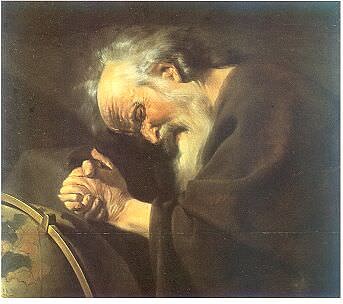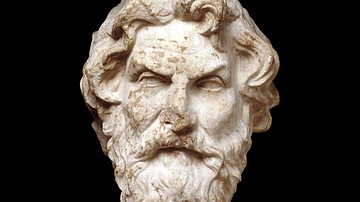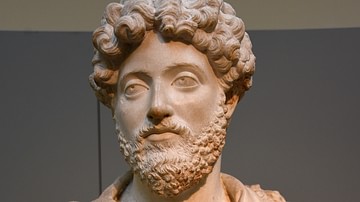Heraclitus of Ephesos (l. c. 500 BCE) was an early Pre-Socratic philospher who claimed that the First Cause of existence was fire and that life itself was characterized by strife and change. Heraclitus did not see this condition as a bad thing, however, but simply as the nature of life itself, as the fundamental essence of what makes life what it is. He saw a unity to the whole of human experience which was characterized by change and that unity he expressed in the Greek phrase Panta Rhei: Life is Flux. All of human life is constant change and it is this very change which unites our experience and which makes us human.
Heraclitus seems to have written a considerable amount but all that remains of his work are fragments. These fragments, however, suggest that he developed a philosophy based on the concept of fire as the First Cause, change as synonymous with life, and the importance of waking to the actual meaning of one's life - as opposed to accepting other people's opinions as truth - and remaining in a perpetual state of awareness. This awareness allowed one to consistently expect the unexpected and so remain open to all the possibilities existence has to offer.
Heraclitus' Complaints
Heraclitus was a great critic of his fellow citizens, as well as of other philosophers of his time, for their seeming failure to recognize this fundamental truth about their lives. In addition to his famous quotes on the nature of life being equal to change, Heraclitus had much to say regarding the habits of human beings and prescripts for how they could live better or, at least, more sensible, lives.
Heraclitus is especially critical of the early writer Hesiod (8th century BCE), known as the Father of Greek Mythology in the present day for his Theogony which set down the tales of the Greek gods in written form. Heraclitus complains that Hesiod “did not understand day and night” (DK 57) by which he means that there would be no day without night and yet, in the Theogony, Hesiod writes of the two being distinct from each other with day being `good' and night `bad'.
He is equally critical of philosophers like Parmenides (l. c. 485 BCE) who insisted on a unity of existence which did not admit of change. To Parmenides, the essence of existence was One and plurality was an illusion caused by the senses. If one believed that things changed in life, one was deceived because the essence of any thing was uniform and only appearances changed. To Parmenides, a person may appear to grow older but the actual essence of that person could not possibly do so because it was part of the essence of every other person and of all living things everywhere.
Heraclitus thought this was absurd, noting that change is not only apparent but is necessary for the continuation of life. Those who argued otherwise, he claimed, were asleep because, "To [the Universe], all things are beautiful, good, and just; but men have assumed some things to be unjust, others just" (Dk 102, Freeman, 31). People fear change because they fear losing what they love but fail to realize that nothing living can remain static and continue to thrive; only living things change and, to Heraclitus, this is their defining characteristic. To reject the concept of change, he would say, is to reject life itself.
To Heraclitus, designations such as "good" and "bad" were simply two sides of a coin and had no final meaning. Like everything else, good and bad and day and night were one and in constant, eternal change or, as he puts it, "The way up and down is one and the same" (DK 60, Freeman, 29). If everything is constantly in flux, and nothing is permanent, then definitions must be kept fluid and one must keep one's self open to transformative possibilitites.
Heraclitus' Fragments
His work was considered important enough to have been preserved by later philosophers and writers and, largely, in the sprawling books of the philosophical biographer Diogenes Laertius (l. c. 180-240 CE) whose Lives of the Eminent Philosophers was written to preserve stories about earlier Greek philosophers and their works. Unfortunately, Laertius wrote freely, without regard to citing sources and so scholars routinely dismiss much of what he reports.
The fragments of Heraclitus and others, however, are often repeated in the works of others and so are regarded as authentic. The following fragments are taken from Kathleen Freeman's Ancilla to the Pre-Socratics. There are many included in that work of which only some are included below:
If happiness lay in bodily pleasures, we would call oxen happy when they find vetch to eat (DK 4).
The sun is new each day (DK 6).
That which is in opposition is in concert, and from things that differ comes the most beautiful harmony (DK 8).
Every creature is driven to pasture with a blow (DK 11).
If one does not hope, one willnot find the unhoped-for, since there is no trail leading to it and no path (DK 18).
When they are born, they are willing to live and accept their fate (death); and they leave behind children to become victims of fate (DK 20).
There await men after they are dead things which they do not expect or imagine (DK 27).
The best men choose one thing rather than all else: everlasting fame among mortal men. The majority are satisfied, like well-fed cattle (DK 29).
Men who love wisdom must be inquirers into very many things indeed (DK 35).
Much learning does not teach one to have intelligence; for it would have taught Hesiod and Pythagoras, and again, Xenophanes and Hecataeus (DK 40).
When you have listened, not to me but to the Logos, it is wise to agree that all things are one (DK 50).
Hesiod is the teacher of very many, he who did not understand day and night: for they are one (DK 57).
Sea water is the purest and most polluted: for fish, it is drinkable and life-giving; for men, not drinkable and destructive (DK 61).
God is day-night, winter-summer, war-peace, satiety-famine. But he changes like fire which when it mingles with the smoke of incense is named according to each man's pleasure (DK 67).
We must not act and speak like men asleep (DK 73).
It is hard to fight against impulse; whatever it wishes, it buys at the expense of the soul (DK 85).
And what is in us is the same thing: living and dead, awake and sleeping, as well as young and old; for the latter of each pair of opposites having changed becomes the former, and this again having changed becomes the latter (DK 88).
To those who are awake, there is one ordered universe common to all, whereas in sleep each man turns away from this world to one of his own (DK 89).
Corpses are more worthy to be thrown out than dung (DK 96).
I searched into myself (DK 101).
To God, all things are beautiful, good and just; but men have assumed some things to be unjust, others just (DK102).
Character for man is destiny (DK 119).
Cold things grow hot, hot things grow cold, the wet dries, the parched is moistened (DK 126).
One thing increases in one way, another in another, in relation to what it lacks (DK 126b).
The shortest way to fame is to become good (DK 135).
Among the best-known fragments is Heraclitus' claim usually given as "one cannot step into the same river twice" which is actually translated from the Greek as "In the same river we both step and do not step, we are and are not" meaning that, since the waters of a river are constantly in motion, one cannot ever experience the same waters across one's feet (Baird, 20). In this same way, life is also in constant motion and one should not expect any aspect of it to remain still for one's personal pleasure.
Conclusion
The fragments of Heraclitus suggest a completely developed philosophy based on the recognition of change as the fundamental essence of life and, at the same time, the importance of remaining aware of this at all times. His admonition above that one should not "act and speak like men asleep" encourages an audience to shake off the illusion of permanence in life and embrace the reality of change.
Heraclitus himself is said to have had as much a problem with change - in the form of accepting advice from others - as anyone else, however. It is claimed that, toward the end of his life when he was ill, he presented his symptoms to the doctors in the form of riddles and, when they tried to address his situation, he grew impatient and went off to tend himself, resulting in his death.
Whether the story is true cannot be determined but it does not detract from his philosophy as it is fairly commonplace that visionaries cannot live up to their own idealism. His thoughts on the nature of life and how best to live in it would inform the works of later philosophies, even those of Plato and Aristotle, and remain an important source of guidance for those of the present day who still have an aversion to change and hope to cling to what they can never hold.






